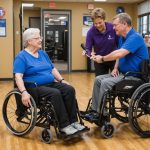Evidence-Based Strategies for Enhancing Cognitive Function
The Role of Mental Exercises
Mental exercises are a crucial aspect of cognitive enhancement, playing a significant role in maintaining and improving cognitive health. Engaging in activities like puzzles, memory games, and problem-solving tasks fosters better brain function. These exercises target various cognitive domains, encouraging neural growth and maintaining mental acuity.
Experts recommend that brain training be done regularly to be most effective. Typically, sessions should last at least 30 minutes, and be performed several times a week. Incorporating diverse mental exercises ensures comprehensive cognitive benefits, addressing areas such as memory, attention, and reasoning.
Also read : Top Proven Strategies to Inspire Sedentary Adults to Embrace Active Lifestyles
Examples of effective cognitive activities include:
- Sudoku
- Chess and card games
- Crossword puzzles
These activities provide enjoyment while simultaneously promoting cognitive health.
The Impact of Nutrition on Brain Health
Nutrition significantly influences cognitive function. Key nutrients like Omega-3 fatty acids, antioxidants, and vitamins such as B and D are vital for brain health. A diet rich in fruits, vegetables, and whole grains supports enhanced cognitive functions, while simultaneously reducing the risk of decline.
Incorporating foods such as fatty fish, berries, and green leafy vegetables is beneficial. These choices provide essential nutrients that bolster brain function and promote mental well-being.
The Importance of Cognitive Wellness
Cognitive wellness is pivotal for preserving mental well-being as individuals age. It plays a significant role in maintaining an active and fulfilling life, directly impacting overall health. Older adults face common challenges such as memory lapses and reduced processing speed, often attributed to the natural aging process. These changes can influence day-to-day functioning and quality of life.
Fostering cognitive health through various strategies can mitigate such effects, promoting autonomy and enhancing life’s richness. Cognitive wellness supports independent living by enabling individuals to participate actively in decision-making and daily tasks. This empowerment maintains dignity and personal freedom, two elements crucial for emotional and psychological well-being.
Understanding the dynamics of cognitive function amid aging helps individuals and caregivers develop appropriate interventions. Engaging in cognitive-enhancing activities and adopting a proactive approach can counter potential declines. Programs and activities designed to support mental vitality are essential for prolonging mental sharpness and preserving an individual’s ability to navigate life independently.
Encouraging older adults to embrace cognitive health strategies not only improves mental acuity but also fosters a sense of control over one’s health journey. By making informed choices, individuals can better adapt to the cognitive changes associated with aging, reinforcing overall mental resilience.
Importance of Cognitive Wellness
Cognitive wellness is crucial for sustaining overall mental well-being, particularly as individuals age. It directly influences an individual’s quality of life by maintaining cognitive health, which ensures active and fulfilling participation in daily activities. As people get older, they often face cognitive challenges, such as memory lapses or reduced processing speed, which can affect their independence.
These age-related changes in cognitive function may reduce an individual’s ability to engage in daily tasks, leading to a diminished sense of autonomy. However, by prioritising cognitive wellness, older adults can mitigate these effects, promoting a balanced and enjoyable lifestyle. This focus on cognitive health supports independent living by empowering individuals to make decisions and manage their day-to-day activities effectively.
Actively addressing cognitive wellness can significantly enhance one’s life quality, maintaining dignity and personal freedom. This focus is not only crucial for emotional well-being, but it also encourages self-sufficiency in navigating the challenges associated with aging. By understanding and implementing cognitive health strategies, both individuals and caregivers can better adapt to age-related cognitive changes, ensuring a harmonious and empowered aging process.
Importance of Cognitive Wellness
In the tapestry of cognitive health, maintaining wellness is paramount for older adults. As age advances, individuals often face cognitive challenges – memory lapses and reduced processing speed being the most prevalent. These changes, although common, can impact one’s autonomy and overall quality of life.
Cognitive wellness plays a significant role in preserving mental well-being. It offers a buffer against age-related declines, ensuring that the elderly can lead active and fulfilling lives. This proactive approach allows older adults to continue engaging in valuable decision-making processes and manage their daily activities independently.
The enhancement of cognitive wellness directly contributes to independence, providing individuals with a sense of control over their life’s journey. Mental well-being becomes a foundation, supporting emotional resilience and self-sufficiency. Consequently, understanding the dynamics of cognitive wellness allows for the development of tailored strategies, enabling the elderly to thrive rather than merely survive.
Adopting cognitive health strategies into daily routines can effectively bolster this wellness. Encouragement for regular mental exercise, balanced nutrition, and social engagements helps mitigate the effects of aging. Recognising the critical role of cognitive wellness, individuals and caregivers can contribute positively to mental robustness, maintaining dignity and enriching life experiences.











